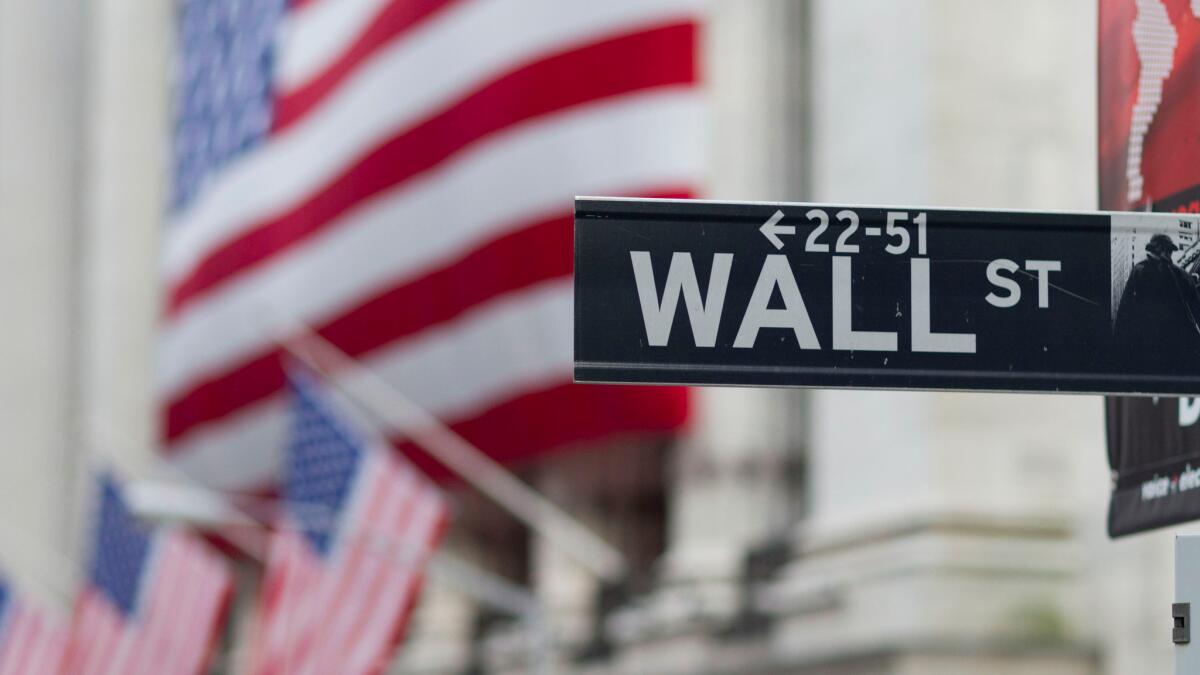Stocks fall further as technology sell-off continues

U.S. stock indexes slipped again Monday as technology companies, which were near record highs last week, suffered a second day of sharp losses. Investors are changing course and selling some of the best-performing stocks of the year while buying shares of companies that have struggled.
Technology companies have surged in recent months, and Monday almost all of the losses came from the big companies that have led the way recently: Apple, Microsoft, Facebook and Alphabet, Google’s parent company. Stocks fell hard in early trading, but they gradually recovered part of their losses as the day went on.
Julian Emanuel, an equity strategist for UBS, thinks technology stocks may fall a lot further and wind up 10% lower than they were last week. He said the tech firms should continue to do well, but the stocks have done so much better than the rest of the market in recent months that they are due for a downturn.
“Any time that you have that degree of extreme sector outperformance, two things happen: The overall market tends to get a bit more volatile, and the leading group tends to underperform the laggards,” he said.
Investors took a new look at some groups of companies that haven’t done that well in 2017, including energy, telecommunications and real estate companies. Some of the best-performing stocks fell, including consumer-focused companies, healthcare companies, utilities and basic materials makers.
The Standard & Poor’s 500 index slipped 2.38 points, or 0.1%, to 2,429.39. The Dow Jones industrial average, which closed at a record high Friday, fell 36.30 points, or 0.2%, to 21,235.67. The Nasdaq composite dropped 32.45 points, or 0.5%, to 6,175.46. The Russell 2000 index of small-company stocks slid 2.50 points, or 0.2%, to 1,419.21.
Apple dropped 2.5% to $145.32, Alphabet fell 0.9% to $961.81, Facebook fell 0.8% to $148.44, and Microsoft fell 0.8% to $69.78. Other 2017 top performers also tumbled: Activision Blizzard sank 2.2% to $56.76, Netflix dived 4.2% to $151.44, and semiconductor firm Skyworks Solutions declined 3% to $103.76.
Technology stocks have done far better than the rest of the market this year and were close to all-time highs before Friday’s drop. The technology component of the S&P 500 index shed 2.7% Friday, erasing a month’s worth of gains.
General Electric, meanwhile, made its biggest gain in almost two years after it said Chief Executive Jeffrey Immelt will step down after 16 years at the helm. John Flannery, the head of GE’s healthcare division, will take over the post in August. Immelt will remain GE’s chairman until the end of this year. In recent years GE has sold or split off numerous businesses, including its financial services division, and focused on new technologies as it returned to its roots as an industrial company.
GE stock climbed 3.6% to $28.94, its largest one-day jump since October 2015.
Trovagene jumped 20% to 97 cents after the San Diego developer of diagnostic technology announced a deal to provide AstraZeneca with a urine biomarker test and services for use in a study.
Benchmark U.S. crude rose 25 cents to $46.08 a barrel in New York. Brent crude, used to price international oils, rose 14 cents to $48.29 a barrel in London. Among energy companies, Exxon Mobil rose 1% to $82.93, and Chevron ticked up 1.5% to $108.04.
Energy companies are down 12% this year and phone companies have fallen almost 9%, but both climbed Monday. Verizon rose 1% to $47.19. Real estate companies have lagged the market this year, and they rose as well.
Stocks that took a rare downturn included Amazon, which fell 1.4% to $964.83, and drug and medical device maker Baxter International, which dropped 3% to $57.15.
The Federal Reserve is scheduled to meet Tuesday and Wednesday, and investors expect the central bank to raise interest rates for the third time since December.
Emanuel, of UBS, said that if the Fed takes an upbeat view of the economy, investors probably will keep selling technology stocks and put their money into consumer-focused companies, banks, and other industries that should benefit from continued economic growth. But if the Fed is more pessimistic, investors may look for yield and safer investments and buy bonds and high-dividend stocks instead.
Bond prices wobbled and turned lower. The yield on the 10-year Treasury note rose to 2.21% from 2.20%.
In other energy trading, wholesale gasoline slipped 1 cent to $1.49 a gallon. Heating oil fell less than 1 cent to $1.43 a gallon. Natural gas fell 2 cents to $3.02 per 1,000 cubic feet.
The dollar fell to 109.79 yen from 110.20 yen. The euro inched up to $1.1208 from $1.1195. The British pound continued to fall after Britain’s general election, sliding to $1.2657 from $1.12724. The election’s outcome could affect Britain’s bargaining position in its exit talks with the European Union.
Gold slipped $2.50 to $1,268.90 an ounce. Silver fell 28 cents to $16.94 an ounce. Copper fell 3 cents to $2.62 a pound.
Overseas stock markets also stumbled. France’s CAC 40 dropped 1.1% and the Germany DAX shed 1%. Britain’s FTSE 100 lost 0.2%. The benchmark Nikkei 225 in Japan fell 0.5% and South Korea’s Kospi declined 1%. The Hang Seng of Hong Kong dropped 1.3%.
UPDATES:
2:05 p.m.: This article was updated with closing prices, context and analyst comment.
This article was originally published at 7:55 a.m.
More to Read
Inside the business of entertainment
The Wide Shot brings you news, analysis and insights on everything from streaming wars to production — and what it all means for the future.
You may occasionally receive promotional content from the Los Angeles Times.










